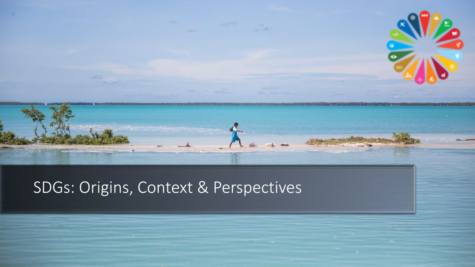Within the Systems Thinking Ontario community, we were fortunate to have Nenad Rava step up to explain how the Sustainable Development Goals came to be, and relate them to systems change.
This May session of Systems Thinking Ontario was a quick follow-on for the March edition on Ecological Limits to Development: Living with the SDGs. March was a launch for a scholarly book. In May, the self-introductions at the beginning of our session confirmed that attendees were open to hearing more about the history of the SDGs, and what they mean to us, today.
To allow more time for the three discussion periods in the progressivbe presntation, asked participants for a quick check-in via text chat. The introducton to the book started after 3m12s in.
This recording of the session is available on Youtube, as well as on the Internet Archive .
| Video | H.264 MP4 |
| May 8 (1h39m) |
[20230508_ST-ON Rava_SDGs 1920×1080.mp4] (FHD 1920×900 206kbps 238MB) [on the Internet Archive] |
A standalone audio was also created during the meeting.
| Audio | |
| May 8 (1h39m) |
[20230313_ST-ON EcologicalLimitsToDevelopment.m4a] (90 MB) [on the Internet Archive] |
Here is the original abstract sent in advance.
Within the Systems Thinking Ontario community, we have an authority on the Sustainable Development Goals with Ned (Nenad Rava), Head of Programmes, Joint SDG Fund. The interest in the March 2023 ST-ON session peaked some interest into unpacking the history and trajectory of the SDGs.
As an opportunity for novices and the immersed to participation in a conversation around the SDGs, we will center on three questions:
(1) How did the SDGs come to be, and Why? (10min)
- Discussion: In what ways SDGs relate to sustainability? Do we even need (global) goals? What are the implications for businesses, academia, grass-roots? (10min)
(2) What do SDGs have to do with systems change? (15min)
- Discussion: Reality check: a genuine approach to systems change or just “buzzwords”? How do the SDGs relate to other systems approaches to sustainability (from flourishing to systems dynamics)? (15min)
(3) Where do we stand in early 2023? What happens next? (10min)
- Discussion: What does this mean for Canada? What is the impact of the post-COVID crises (including the triple crisis of food, energy, financing)? What can we do as individuals/ Canadians?
Bio:
- Dr Nenad Rava has an eclectic background including comparative politics, public sector modernization and institutional reform, cross-sectoral public policy, strategic foresight, and business innovation. Besides a BSc in management and PhD in politics, he also holds a Master of Design degree in Strategic Foresight and Innovation at OCADU.
- Dr Rava has contributed to complex systems change through more than 120 senior-level engagements in over 45 countries. Amongst other, he has produced 35+ research reports, articles and other publications (including a chapter on “Systems Design Approach to Public Policy” in the Handbook on Systems Sciences) [open access via SharedIt, or via Medium] and 80+ educational and training programs.
- Dr Rava supported the finalization of co-design and launch of the Joint SDG Fund at the UN HQ in 2018, led the first portfolio of 35 programs benefiting 147 million most vulnerable persons in 2020-2022, and currently incubates new SDG transformation priorities.
The session will be moderated by David Ing.
Suggested pre-reading
Basics
- Goals (including targets/ indicators, history, publications): https://sdgs.un.org/goals
- SDG report for 2022 (July 2022): https://unstats.un.org/sdgs/report/2022/
- Foundational Primer on the 2030 Agenda for Sustainable Development (November 2019): https://unsdg.un.org/SDGPrimer
- MAPS (March 2016): https://www.un.org/ecosoc/sites/www.un.org.ecosoc/files/files/en/qcpr/doco-summary-brief-on-maps-march2016.pdf
Joint SDG Fund
- Joint SDG Fund: https://www.jointsdgfund.org/
Canada
- Canada and SDGs (with second Voluntary National Review in July 2023): https://www.canada.ca/en/employment-social-development/programs/agenda-2030.html
- SDG profile for Canada (latest data): https://unstats.un.org/sdgs/dataportal/countryprofiles/CAN
- New Policy Direction for 2030: the Sustainable Development Goals (Canadian Government Executive, January 2017): http://canadiangovernmentexecutive.ca/dig/23_01/#8
- Canada Voluntary National Review (2018): https://hlpf.un.org/countries/canada/voluntary-national-review-2018
Universities
- SDGs and Universities: https://www.univcan.ca/sustainable-development-goals/



